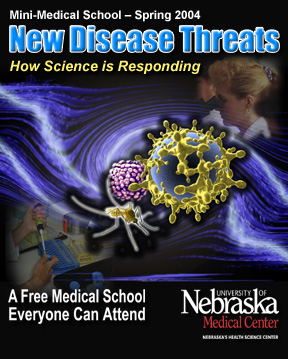 UNMC and co-sponsors in 12 cities across Nebraska invite the public to participate in a free health educational series titled, “New Disease Threats: How Science Is Responding.” The series will run on Wednesdays, April 7, 14, 21 and 28, from 6:30 to 8:30 p.m. (CDT).
UNMC and co-sponsors in 12 cities across Nebraska invite the public to participate in a free health educational series titled, “New Disease Threats: How Science Is Responding.” The series will run on Wednesdays, April 7, 14, 21 and 28, from 6:30 to 8:30 p.m. (CDT).
“Many people want to know why we are seeing an increasing number of new diseases,” said Steven Hinrichs, M.D., professor of pathology and microbiology at UNMC.
Mini-medical school participants will learn about new disease threats, such as West Nile virus, monkey pox, SARS and mad cow disease, what health professionals and scientists are doing to combat them and what Nebraskans can do to decrease their risk of getting these diseases. Participants also will learn about: the new strains of flu; antibiotic resistance and the danger that poses; foodborne illnesses and how to prevent them and about Hepatitis C. For this series, UNMC has brought together experts in infectious diseases, public health and biosecurity.
The series will be broadcast live from Omaha via satellite to 12 Nebraska communities: Columbus, Grand Island, Hastings, Holdrege, Kearney, Lincoln, Norfolk, North Platte, O’Neill, Red Cloud, Rushville and Scottsbluff. Other communities that are interested in down linking this program can contact UNMC Public Affairs at (402) 559-4353. The broadcasts will be transmitted on Nebraska Satellite System 2 Channel 102 (Nebsat 2 Channel 102). If facilitators have questions regarding the transmission, they can contact Brenda Jeter at (402) 559-9049.
The goal of UNMC Mini-Medical School is to educate Nebraskans on health issues that affect them, as well as highlight the strides being made in research and treatment at UNMC.
 “It seems like every time we pick up a newspaper there is another new disease threat occurring somewhere in the world, whether it’s the monkey pox virus from prairie dogs or West Nile virus from mosquitoes,” said Dr. Hinrichs, who will kick off the series April 7 with an overview of the diseases and the threats they pose. “Much of what we are seeing is due to the impact of a global economy, where not only are people moving around the world more often and more quickly, but we are also hearing about news events in parts of the world that were never discussed in the news media before.”
“It seems like every time we pick up a newspaper there is another new disease threat occurring somewhere in the world, whether it’s the monkey pox virus from prairie dogs or West Nile virus from mosquitoes,” said Dr. Hinrichs, who will kick off the series April 7 with an overview of the diseases and the threats they pose. “Much of what we are seeing is due to the impact of a global economy, where not only are people moving around the world more often and more quickly, but we are also hearing about news events in parts of the world that were never discussed in the news media before.”
For example, a disease that has been present for many hundreds of years in the Middle East is now transported to the United States for the first time and begins moving across the country, Dr. Hinrichs said. In addition, he said, exotic animals are being imported from places that were never allowed to export these animals previously. Dr. Hinrichs said another contributing factor might be that the density of humans in certain parts of the world is reaching greater numbers than ever before allowing for rapid transmission of diseases.
“We have all learned that the world is changing, and if we want to make sure we take every precaution against being caught off guard, we need to continually learn more about the world in which we live,” he said.
Seating is limited. Registration is required. To get more information about the series, go to: www.unmc.edu/diseasethreats. While the program is free to the public, Nebraska and Iowa nurses who wish to receive eight contact hours of continuing nursing education credits can do so at a cost of $40 through the UNMC College of Nursing.
UNMC Mini-Medical School dates, topics and presenters:
April 7 — “21st Century Plagues: Is the Potential There?” presented by Steven Hinrichs, M.D., director of the University of Nebraska Center for Biosecurity and professor in the department of pathology and microbiology at UNMC; “Antibiotics: Too Much of a Good Thing,” presented by Mark Rupp, M.D., associate professor, infectious diseases and department of internal medicine, UNMC.
April 14 — “What’s New with the Flu?” presented by Jose Romero, M.D., associate professor, pediatrics and pathology/microbiology, and chief Latino recruitment officer for UNMC; “Stopping SARS,” presented by Anne Mardis, M.D., MPH., medical epidemiologist, Nebraska Health and Human Services System, Bioterrorism Response Section of the division of Public Health Assurance; “Hepatitis C: Who’s at Risk?” presented by Mark Mailliard, M.D., associate professor, internal medicine and director of the Comprehensive Hepatitis C Clinic, UNMC.
April 21 — “West Nile Virus: Addressing the Threat,” presented by Richard A. Raymond, M.D., chief medical officer Nebraska Health and Human Services System and Wayne Kramer, medical entomologist, Nebraska Health and Human Services System; “Star Wars in the Laboratory: New Technology in Diagnostic Testing,” presented by Tony Sambol, assistant director, Nebraska Public Health Laboratory.
April 28 — “Preventing Foodborne Illnesses,” presented by Andre Kalil, M.D., assistant professor, infectious diseases, UNMC; “Mad Cow Disease,” presented by Howard E. Gendelman, M.D., director of the Center for Neurovirology and Neurodegenerative Disorders, UNMC.